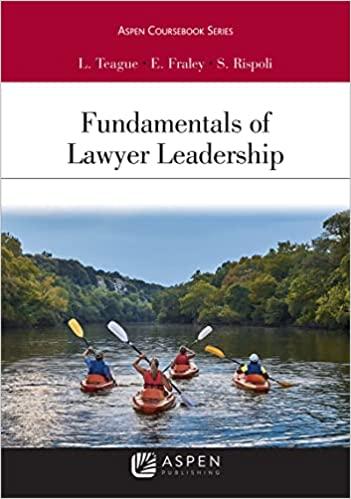Question
Urgent please!! Question 1 (1 point) In which one of the cases listed below did the court, in ruling that a party to an illegal
Urgent please!!
Question 1 (1 point)
In which one of the cases listed below did the court, in ruling that a party to an illegal contract cannot ask a court of law to help carry out an illegal objective, state that "no court should be required to serve as a paymaster of the wages of crime. . ."?
Question 1 options:
a) Northern Indiana Public Service Co. v. Carbon County Coal Co.
b) Cochran v. Dellfava.
c) Troutman v. Southern Railway Co.
d) T.F. v. B.L.
Question 2 (1 point)
Scammer hires Expert to build a device to capture data from ATM cards. Scammer provides technical specifications to Expert on specific ATM models that Scammer wants to use the device on, together with security protocols used by the banks that operate those ATM models. Expert builds and delivers the device, but it does not work on all of the ATM models Scammer specified, and Scammer refuses to pay. When Expert sues to enforce the contract:
Question 2 options:
a) Expert will prevail, because Scammer has no defense for non-payment.
b) Scammer will prevail, because the device only meets some of the required criteria and express conditions require strict satisfaction.
c) Scammer will prevail, because the contract violates public policy.
d) Expert will prevail, but will only be able to recover a portion of the contract price due to the reduced value of the device.
Question 3 (1 point)
In which one of the cases listed below did the court, in deciding the defendant entered an implied contract with the plaintiff, rely in part on the principle that the "defendant's subjective intent is irrelevant when she knows or has reason to know that her objective actions manifest the existence of an agreement?"
Question 3 options:
a) Northern Indiana Public Service Co. v. Carbon County Coal Co.
b) Singleton v. Foreman.
c) Troutman v. Southern Railway Co.
d) T.F. v. B.L.
Question 4 (1 point)
Which one of the following statements regarding the illegality of
attorney contracts is not correct? Question 4 options:
a) "Champerty" is splitting the fruits of litigation.
b) The Restatement authorizes lawyers to advance litigation expenses on behalf of a client.
c) Lawyers may acquire a proprietary interest in the client's cause of action.
d) The Restatement treats the client's grant to the lawyer of literary or media rights with respect to the representation as a forbidden financial arrangement.
Question 5 (1 point)
In which case did the court characterize the conduct of one of
the parties as "an unseemly and deplorable belligerency"? Question 5 options:
a) T.F. v. B.L.
b) Singleton v. Foreman.
c) Cochran v. Dellfava.
d) Northern Indiana Public Service Co. v. Carbon County Coal Co.
Question 6 (1 point)
In which one of the following cases did the court decide that a contract for an attorney to use his influence to obtain an audience with the President was enforceable?
Question 6 options:
a) Northern Indiana Public Service Co. v. Carbon County Coal Co.
b) Cochran v. Dellfava.
c) Troutman v. Southern Railway Co.
d) T.F. v. B.L. Question 7 (1 point)
In which one of the following cases did the court state that its authority to enforce the lawful portion of an otherwise illegal contract depends on whether the lawful portion is severable from the larger agreement?
Question 7 options:
a) T.F. v. B.L.
b) Singleton v. Foreman.
c) Cochran v. Dellfava.
d) Northern Indiana Public Service Co. v. Carbon County Coal Co.
Question 8 (1 point)
In which one of the following cases did the court have to consider the "reciprocal dangers of deterrence and underdeterrence [sic]" in determining whether there should be a judge-made remedy in addition to statutory remedies?
Question 8 options:
a) T.F. v. B.L.
b) Singleton v. Foreman.
c) Cochran v. Dellfava.
d) Northern Indiana Public Service Co. v. Carbon County Coal Co.
Question 9 (1 point)
Which one of the following statements regarding purposeful interpretation and reformation of illegal executory bilateral contracts is not accurate?
Question 9 options:
a) Reformation is not available for mistake of law.
b) De facto reformation often occurs under the doctrines of severance and divisibility.
c) There are cases where the court rewrites the contract to conform to the law relying on no particular doctrine.
d) If either a legal or illegal meaning can be attributed to an agreement, courts will prefer the interpretation giving the agreement a legal meaning.
Question 10 (1 point)
In which one of the cases listed below did the court state that courts have allowed recovery by a plaintiff in an illegal contract provided the plaintiff's conduct was malum prohibitum and not malum in se?
Question 10 options:
a) Northern Indiana Public Service Co. v. Carbon County Coal Co.
b) Cochran v. Dellfava.
c) Troutman v. Southern Railway Co.
d) Singleton v. Foreman.
Step by Step Solution
There are 3 Steps involved in it
Step: 1

Get Instant Access to Expert-Tailored Solutions
See step-by-step solutions with expert insights and AI powered tools for academic success
Step: 2

Step: 3

Ace Your Homework with AI
Get the answers you need in no time with our AI-driven, step-by-step assistance
Get Started


